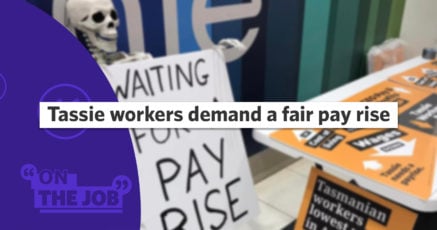As the COVID-19 pandemic grinds on, paramedics have never been more vital.
Or more tired.
Paul* became a paramedic five years ago. It was the culmination of a lifelong ambition to work in a job in which he could help others. He loves his job, but in these trying times, it’s taking its toll on him.
“I still love it and that’s the hard thing because sometimes you hate yourself for loving it because you put yourself through the wringer of 14-hour night shifts and being away for big things [like weddings and important events] but I still enjoy helping the community.”
That commitment to public service has been tested though. As he speaks to On the Job, Paul is just decompressing after a horrid week dealing with the growing COVID-19 outbreak.
He’s determined to keep doing the work but is getting harder.
“When I walk around at work you can see a lot of my colleagues are drained already. The job itself takes a lot out of you on a good day, but with all of this [the COVID-19 outbreaks] it really does take a toll,” Paul explained.
“I mean it’s 3 am in the morning and you’re cleaning the truck and the stretcher or those little monotonous tasks that build up over time, it does get tiring and difficult.”
Paul said he has noticed a shift in public attitudes over the last few months as the pandemic once again tightened its grip on the community.
“Last year it felt as though everyone was doing everything the possibly could to help others in the community,” he said.
“Now it feels like a lot of people are over it. With first outbreaks [in 2020] when we would go to a job during the peak of the outbreak, when you arrived, everyone was wearing a mask and was mindful of social distancing.
“Nowadays, when we arrive – and I know it’s people’s homes – but at the same time we have to protect ourselves, you’ll find people pushing back asking do they really have to put a mask on.
“It’s a complacency that’s crept in.”
Aggression and violence have become something that all frontline health care workers and first responders have had to deal with, but Paul said it has gone to another level recently.
“It’s always been an issue for healthcare staff, but this year there is also a minority of people who are frustrated and angry and see us as a vessel of the Government or of pushing what they believe to be an agenda they’re opposed to,” said Paul.
“It’s hard not to feel angry sometimes. We’re all human, and when you’ve just had to help someone who has been stricken by COVID-19 so badly that their life is on the line, and then the next person you deal with suggests that it’s all just a conspiracy, that can be quite insulting.”
Paul takes comfort in the solidarity of his co-workers, who have rallied to one another in these tough times.
“We’re a very tight-knit group. For instance, we have our EBA [Enterprise Bargaining Agreement] and our meal breaks, but we’re not always able to get to them on time.
“We find ways to take care of other people’s patients while we ramp [wait for access to the hospital Emergency Department] so that people can go eat. It’s about doing your bit so others can get by.”
The young paramedic can’t speak highly enough about the support he has received from his union.
“The union has been fantastic. At the start of 2021 we were quite behind with the mandatory vaccination rollout and that became a big priority. Within a few weeks we were in the front of the queue getting vaccinated,” said Paul.
“They’ve been really great with our sick leave. If you get sick with COVID-19 they ensure you get looked after under WorkCover.
“The union has been great with workers safety, ensuring we always have appropriate PPE. They’ve been great in communicating our concerns and making sure we have what we need.”
As Paul ended our chat, he said he’s looking forward to a couple of days of not having to kit up and head out to another distress call from someone in need.
When the time comes though, he’ll be ready and willing to get back out there.
We’re all very lucky that we have people like him and his colleagues who will be ready to be there for us when we need them most.
*Paul asked us not to use his real name for safety reasons.








SHARE:
On the frontline: a paramedic shares his experience of the pandemic